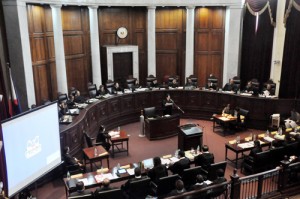CHIEF Justice Maria Lourdes Aranal-Serenio has risked facing complaints for not inhibiting herself in the Manila Electric Co. (Meralco) power rate hike case.
Sereno appeared before the oral arguments on Tuesday in the high tribunal despite the fact that her former law partner now acts as legal counsel for Meralco, retired high court magistrate Florentino Feliciano.
The chief justice has refused to recuse herself and stood her ground to handle and preside in the Meralco case.
SC Public Information Office (PIO) Chief lawyer Theodore Te said that he does not think Sereno will inhibit herself from the case.
Te even argued that Sereno and Feliciano were not law partners, although Feliciano engaged the services of Sereno as her documentation lawyer in the government case against Piatco.
“I dont think so. They were not law partners,” Te told the media.
Under the high court’s Internal Rules, a magistrate must inhibit herself from the case handled by a former law partner.
Rule 8, Section 3C states that “when a Member of the Division, other than the Member in charge of the case, was counsel or partner or member of a law firm that is or was counsel in the case before the Division, such member shall inhibit himself or herself, unless the Member was no longer a partner or member of the law firm when it was engaged as counsel in the case and the Member votes against the client of such firm.
“In any event, the mandatory inhibition shall cease after the lapse of 10 years from the resignation or withdrawal of the Member from the law firm, unless the Member personally handled the case when he or she was a partner or member of the law firm.”
In contrast, Senior Associate Justice Antonio Carpio voluntarily inhibits himself in each and every case involving his former law office and law partners under the Carpio Villaraza Cruz Marcelo law office.
Notably, Associate Justice Arturo Bion recuses himself everytime the Siguion Reyna law office is involved in a case pending before the Court.
At the oral arguments, the petitioners in the case argued that the Energy Regulatory Commission’s (ERC) go-ahead for Meralco to collect the P4.15 per KWH rate hike has deprived consumers the opportunity to examine the basis for such an increase.
Lawyer Leonard de Vera, legal counsel for petitioner National Association of Electricity Consumers for Reforms (Nasecore), asked the Court to declare as illegal such rate hike for violation of the right to due process.
“The notice, the publication of adjustment of rates, cannot be dispensed with because that’s the essence of due process,” he pointed out.
De Vera said that notice and hearing and publication is necessary before the ERC should carry out the said price hike.
The veteran lawyer quoted the a 2006 Court ruling where a petition was filed against the “pass on provision” to consumers, later declared as unconstitutional for lack of publication.
“The Supreme Court said . . . the notice, the publication of adjustment of rate cannot be dispensed with because that is the essence of due process,” de Vera argued.
For petitioners Bayan Muna, Rep. Neri Colmenares said that ERC committed grave abuse of discretion when it approved without a hearing such an increase.
“Respondent ERC committed grave abuse of discretion amounting to lack of jurisdiction when it hastily approved without a hearing and investigation, the P4.15 rate hike imposed by respondents Meralco and GenCos despite three highly irregular or unprecedented events which should have stayed its hands of approval as market abuse regulator,” Colmenares pointed out.
He even accused Meralco of price manipulation that caused suffering of consumers.
“These acts . . . are antagonistic to the interest of Meralco’s customers, and in violation of Meralco’s duty under Sec. 4 of its franchise which provides that Meralco ‘shall supply electricity to itscaptive market in the least cost manner,’” he pointed out.


